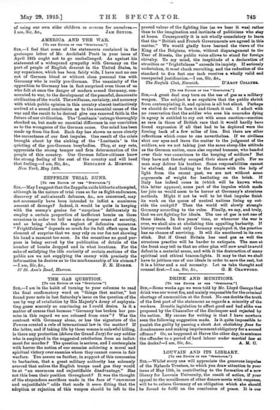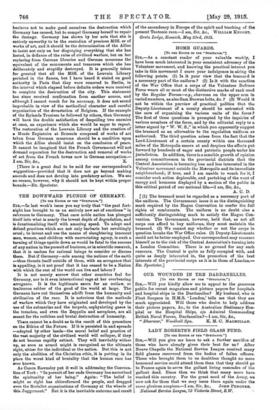LOUVAIN AND ITS LIBRARY. [To an Lass or ass “StworArorun
Snt,—Whilst every one will appreciate the generous impulse of the Ryland. Trustees, to which you draw attention in your issue of May 16th, in contributing to the formation of a new library for Louvain University, the result of action, if your appeal to the munificence of other donors meets with response, will be to relieve Germany of an obligation which she should be forced to fulfil on the conclusion of peace. It is our
business not to make good ourselves the destruction which Germany has caused, but to compel Germany herself to repair the damage. Germany has shown by her acts that she is entirely unworthy to be the custodian of precious MSS. or of works of art, and it should be the determination of the Allies to insist not only on her disgorging everything that she has looted, in defiance of the rules of civilized warfare, but on her replacing from German libraries and German museums the equivalent of the monuments and treasures which she has deliberately and stupidly destroyed. It is generally taken for granted that all the MSS. of the Louvain Library perished in the flames, but I have heard it stated on good authority in Paris that they were removed to Berlin, in the interval which elapsed before definite orders were received to complete the destruction of the city. This statement has since received confirmation from another source, and although I cannot vouch for its accuracy, it does not sound improbable in view of the methodical character and careful organization of the devastation of Belgium. If the example of the Rylands Trustees be followed by others, then Germany will have the double satisfaction of despoiling two enemies at once, an experience which she would be eager to repeat. The restoration of the Louvain Library and the creation of ■ Moser, Expiatoire at Brussels composed of works of art taken from German museums should be a condition upon which the Allies should insist on the conclusion of peace. It cannot be imagined that the French Government will not demand reparation for the destruction and removal of works of art from the French towns now in German oecupation.— [There is a great deal to be said for our correspondent's suggestion—provided that it does not go beyond making amends and does not develop into predatory action. We see no reason, however, why it should not be kept within proper bounds.—En. Spectator.



































 Previous page
Previous page